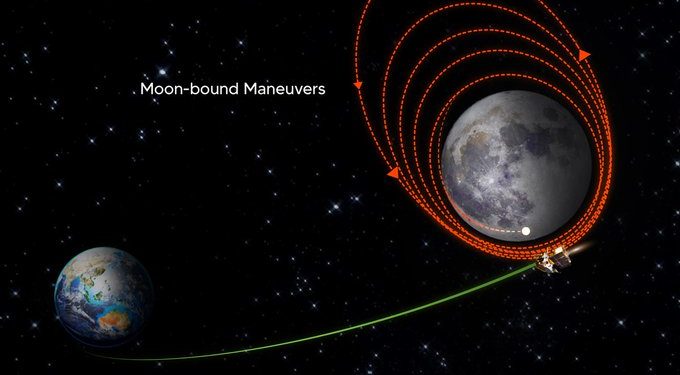Chennai: The Indian Space Research Organisation (ISRO) Saturday evening successfully injected the Chandrayaan 3 spacecraft into the lunar orbit, an official said.
According to the official, the firing of the onboard motors began at about 7.15 p.m. and the spacecraft was steered towards the moon orbit.
The Indian Space Research Organisation (ISRO), in a tweet, said: “MOX, ISTRAC, this is Chandrayaan-3, I am feeling lunar gravity.”
“Chandrayaan-3 has been successfully inserted into the lunar orbit.A retro-burning at the Perilune was commanded from the Mission Operations Complex (MOX), ISTRAC, Bengaluru. The next operation – reduction of orbit – is scheduled for Aug 6, 2023, around 23:00 Hrs. IST.”
Chandrayaan-3 Mission:
“MOX, ISTRAC, this is Chandrayaan-3. I am feeling lunar gravity 🌖”
🙂Chandrayaan-3 has been successfully inserted into the lunar orbit.
A retro-burning at the Perilune was commanded from the Mission Operations Complex (MOX), ISTRAC, Bengaluru.
The next… pic.twitter.com/6T5acwiEGb
— ISRO (@isro) August 5, 2023
The Chandrayaan-3 spacecraft was put into orbit July 14 in a copybook style by India’s heavy-lift rocket LVM3.
The spacecraft comprises a propulsion module (weighing 2,148 kg), a lander (1,723.89 kg), and a rover (26 kg). The main object of the mission is to safely send the lander onto the lunar soil. The lander will get separated from the propulsion module for a couple of days and is later expected to make a soft landing near the South Pole of the moon August 23 evening at 5.47 p.m.
The lander will descend to the moon from a height of about 100 km from the moon’s surface. The soft landing is a tricky issue as it involves a series of complex manoeuvres consisting of rough and fine braking. Imaging of the landing site region prior to landing will be done for finding safe and hazard-free zones.
Subsequent to the soft landing, the six-wheeled rover will roll out and carry out experiments on the lunar surface for a period of one lunar day which is equal to 14 Earth days. On August 1, Chandrayaan-3 completed orbiting around the Earth and headed toward the moon. On that day a successful perigee-firing performed at ISTRAC, ISRO injected the spacecraft into the translunar orbit.





































